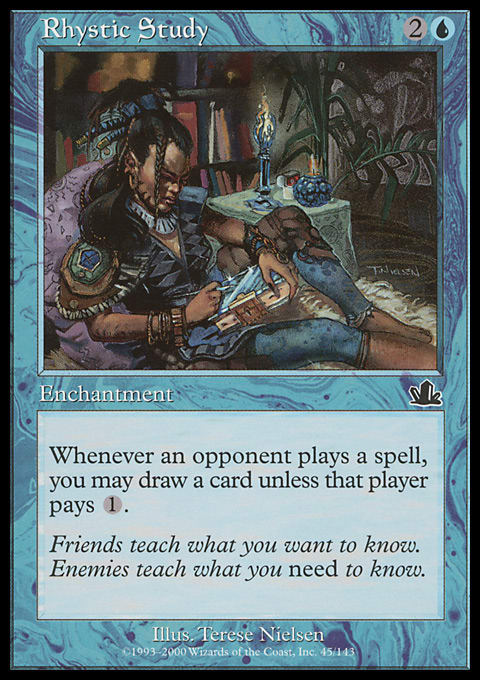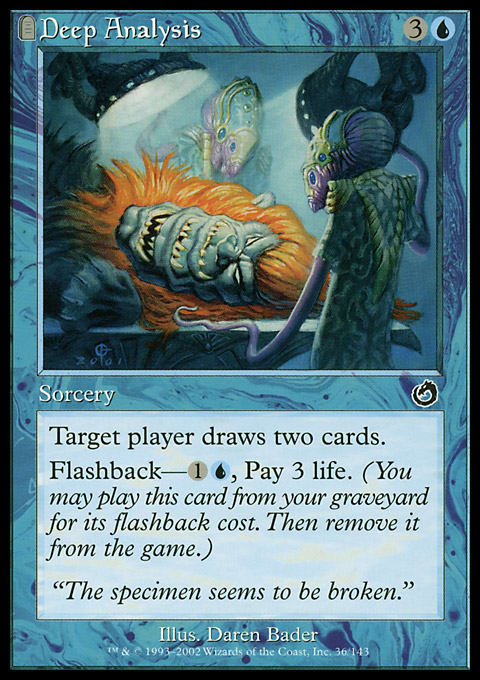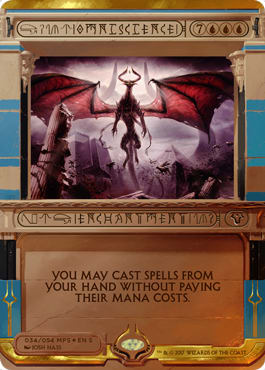So, why do we study? Why should we study?
The goal is simple: correct and remove mistakes from play. Not only is this crucial to winning games in the here and now, but it is also the core method of improving; this much is obvious. What is not obvious is the sheer number of little inefficiencies and mistakes hidden in many games. From misdesigned mana bases to misplaced spells, these things cannot always be seen immediately or with cursory analysis performed in the couple minutes between games. In such cases, in depth study is required.
Why We Make Mistakes
If the goal is to correct and remove mistakes, it’s logical to ask what the source of the mistakes is. Many mistakes Magic players make, even at the highest level, stem from mental shortcuts.
Mental shortcuts exist because Magic is a complicated game. There are too many factors to analyze in any given board state, so we use mental shortcuts to simplify analysis. This fact is not unique to Magic. Here, a comparison to chess is apt.
Like Magic, chess is a complicated game. It is impossible to evaluate every move combination in a given position. Thus, how do chess players determine the best moves? Well, they use shortcuts. How do you form these shortcuts? Here are the two main ways:
- Principles – General rules or concepts (like development, space, and material evaluation), which when followed, tend to result in an advantage for the player following them. This is the way many opening lines are developed in chess.
- Experience – Playing a position a number of times gives you a feel for how you should be using your pieces in the same or similar situations.
However, these shortcuts are not perfect. Each individual position still has to be looked at and evaluated. Shortcuts merely provide guidelines along which to do so.
Magic is the same way.
- Principles – Concepts such as card advantage and mana efficiency allow us to make decisions in unfamiliar situations. These principles serve as shortcuts to allow us to think about how to gain advantage in specific situations.
- Experience – playing a specific deck or matchup often gives us a stronger idea of how to take advantage of our resources, either creating new shortcuts or refining existing ones.
Example time! Consider the card Murder. How should we use it? When is the best time to cast Murder? What is the best creature to cast Murder on? Well, the answer depends on a number of factors. Let’s walk through the development of some mental shortcuts on how to cast Murder.
- Starting Point: I will cast Murder if I have


 available and my opponent has a creature to target.
available and my opponent has a creature to target.
This is a pretty bad shortcut. But how do we improve it? Well, we can add the idea of mana efficiency.
- Revision 1: I will cast Murder if I have


 available and my opponent has spent more than 3 mana on his creature.
available and my opponent has spent more than 3 mana on his creature.
It’s better, but we can improve it some more. How about we add some threat efficiency as well?
- Revision 2: I will cast Murder if I have


 available and one of the following is true:
available and one of the following is true:- My opponent has a more efficient threat than I do.
- My opponent spent a large amount of mana on a single threat.
As you can see, the process of refining a shortcut is a long and difficult one. It’s impossible for shortcuts to cover every possible scenario you will ever encounter in a Magic game. However, what you can do is refine your shortcuts and connect them in such a way as to create a web that will cover the vast majority of situations you encounter.
How do you create this web? You do it through study.
How Do We Review?
It isn’t enough just to go back through games. Asking the right questions is paramount to improving as a player. The key is to continually ask, “Why?” That is the key question. Why did whatever happened happen? Let’s break down some situations and see the types of questions to ask.
- Result: You were blown out by an effect you weren’t expecting. Why did this happen?
- Did your opponent give any indication he had that effect? Did he touch his lands in a specific way? Did he shuffle his cards differently? Did he take an unexpected play line based on the information you had?
- Could you have played around the effect without knowing about it?
- Result: You experienced what you felt was a reversal of fortune. Why did this happen?
- What was the critical turn?
- Were you actually ahead at that point?
- If no, how did your opponent conceal information to make you believe you were ahead?
- If yes, how did you throw away your advantage? Could you have maintained it?
- Result: You played a tight game where there were a lot of decisions were made. Why did you win/lose this game? Examine the game in each stage (early, middle, late)
- How much did your spell sequencing matter?
- Would playing your spells in a different order have changed the resulting situation or game significantly?
- How much did your draw order matter?
- What would have happened if you had drawn your spells in a different order?
- Was the timing of one particular draw crucial?
- How much did your spell sequencing matter?
- Result: A card or ability was much stronger/weaker than you expected. Why?
- Was the situation you found yourself in typical?
- If yes, what about this situation changes the strength of the spell or ability in question?
- If no, did the game state affect the strength of the spell or ability enough to change your evaluation of its strength?
- Is there a specific aspect of the match that affects the strength of the spell or ability in question?
- Was the situation you found yourself in typical?
Where Do We Go?
Asking these questions forces us to delve into the underlying logic behind plays. This results in one of the following benefits:
- A new shortcut
- Refinement of an existing shortcut
- Better understanding of how to adapt shortcuts to specific game situations
This sort of analysis is easiest to perform when time is not a concern and you can go through a situation in as much detail as necessary to fully comprehend it. However, it’s important transfer the lessons learned during study to the table. In other words, the purpose of study is to internalize the lessons, the higher-level thinking being done in order to make better decisions during game play.
Part of this happens through establishing more efficient shortcuts, but the real improvement happens in learning how to use the shortcuts. In Magic, you will often have factors competing for your attention. Each of these factors has one or more shortcuts associated with it. As players, we need to learn to prioritize. This goes back to Finkel’s famous quote: “Focus on what matters.” “What matters” is which shortcut is the most important.
The purpose of the higher-level thinking is ultimately to force us to refine existing shortcuts and teach us how to evaluate the importance of the various competing shortcuts we have. As we do more of this high-level thinking, we internalize more of it and become better at quickly determining which shortcut we should be using when.
Thus, study is absolutely crucial to our development as players, and it is important to go back through games and look at them in detail. Magic Online is an invaluable tool for this, and it’s one I think most players, me included, don’t take sufficient advantage of. This is actually the central reason I want an analysis platform included in the program. The ability to physically manipulate the cards from any given game state would greatly improve a player’s ability to self-analyze, which is crucial to player development and improvement.
It may not be fun, but if you want to become better, you have to study.
Chingsung Chang
Conelead most everywhere and on MTGO
Khan32k5 at gmail dot com




























